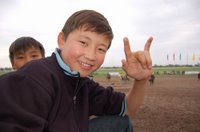
Kyrgyzstan: Happy Place
Well, in case you haven't seen the 2006 survey of the Happy Planet Index (HPI) scores, published by the New Economics Foundation (NEF), Kyrgyzstan ranks 20th out of 178 nations on the list. The HPI tries to present an alternative comparative measure of human progress in each country, other than GDP, by looking at three factors: average life satisfaction, average life expectancy and environmental footprint (EF - how much damage is done to the environment to sustain the national standard of living). Kyrgyzstan, which also ranks first among the former communist states, earned a score of 59.1, with mid-range life satisfaction and life expectancy scores, and a very good EF score. The U.S.? They placed a paltry 150th on the list with a disastrous EF score outweighing good life satisfaction and expectancy scores. Interestingly, though not surprisingly, many island nations, and poor ones at that, ranked near the top, with the sleepy little Pacific ocean nation of Vanuatu scoring the best marks of all. Colombia and Costa Rica came in at the second and third slots, speaking volumes about the importance of the high level of social interconnectedness and "la pura vida" worldview of many latin american countries. In the meantime, I'm glad to be living in the 20th happiest place on earth for now. I just wish my grumpy neighbors in our apartment block would be too.
Bye bye Miss American Pie...
On July 12th, the government of Kyrgyzstan kindly offered the government of the US and A a nice post-Independence Day present by sending two American diplomats home early to see their families. Actually, in another sign that President Bakiev is driving Kyrgyzstan ever closer into Russia's orbit of influence, the Kyrgyz government kicked out the two diplomats for illegal activities with local Non-Governmental Orgranizations (NGOs). The U.S. government vehemently denies the charge, but it is not unlikely that Embassy staff maintains contacts and supports pro-democracy NGOs here since civil society and democracy, such that is nowadays, is in such a precarious state. However, the fact that Bakiev and his corrupt cronies view this as a national threat attests to their insecurity about the opposition movement, their firm desire to slowly strangle it into submission, and their willingness to use Putinesque tactics to model Kyrgyzstan on Russia's Putinocracy. It may also have been a hardball negotiating tactic since the final agreement on the U.S. Military's use of the Ganci Air Base at Manas International Airport was inked only days after the expulsion of the diplomats. As the only rear airbase the U.S. Military now has in Central Asia to resupply forward bases in Afghanistan, the Kyrgyz Government had the U.S. by the, well, cajones. The U.S. was kicked out of Uzbekistan, ostensibly because the U.S. government criticized the Uzbek government's brutal crackdown on the uprising in Andijan last year, but it was also likely that Putin applied tremendous pressure on them to kick out the U.S. as well, as part of Russia's aggressive march to regain influence and supremacy throughout Central Asia. Little Kyrgyzstan is next, and you can well bet Putin wants the U.S. out of his sphere of influence. But the Kyrgyz, wisely, have decided to play the sides against each other and profit as best they can from both. So, the U.S. went from paying an annual lease of $2 million for the use of Ganci, a deal brokered under the ousted Akayev regime, to an estimated $150 million a year under the new lease. Not a bad mark-up for the Kyrgyz. Now the question is, where will the dough go? Akayev supposedly funnelled off all of the money paid out by the U.S. while he was in power, will Bakiev do the same? It's a bit harder to siphon off 150 mil, but you can bet he'll try get his paws in some of the American pie.
Reform This!
And finally, the strange gets stranger in this strange land. On July 5th, the Kyrgyz Ministry of Education revoked the license of the much-lauded Law Program at the American University - Central Asia to confer licenses to practice law in Kyrgyzstan. I must confess bias here since I work at AUCA, but the hypocrisy of this move transcends my bias. In their efforts to show some efforts to reform the higher education system in Kyrgyzstan, which is certainly overpopulated with corrupt, poorly run universities, (with more the 30 degree granting institutions in Bishkek alone, a city of only 1.5 million, and Kyrgyzstan has one of the highest ratios of universities per capita in the world), the Ministry has gone after one most exemplary programs in Central Asia. The only rationale the Ministry gave to our university was that it did not conform to state curriculum standards, which is patently false. In fact, the Ministry has refused to provide any documentation or reports justifying their decision, so the administration, faculty and students are left to wonder what went wrong and what do next?
The university is the only one in Central Asia to employ the American liberal arts model, grounded in critical inquiry and academic integrity. As well AUCA's law program seeks to train the next generation of leaders to help in the establishment of the rule of law and democratic civil society in Central Asia. Finally, AUCA is the most expensive university in Kyrgyzstan. All of these factors make it a prime target for extortion by the Ministry of Education. A few schools on the de-licensing list have already been taken off, reportedly because they made payments to the Ministry. And while the AUCA law department has vowed to take the fight all the way to the highest court, the Minister of Education allegedly told them point blank: "You will not win in court, my best friend is the judge." Stay tuned for more high drama...




